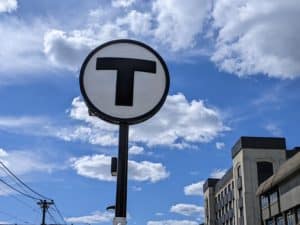The route to improvement for the MBTA is an intimidating one. And for several of the expert panelists at a virtual forum organized by the MBTA Advisory Board, one common factor looms beneath many of the MBTA’s current problems: money.
Ridership still lags below pre-pandemic levels, so MBTA officials need to find a way to pay for those investments using a smaller base of fare revenue while they careen toward the edge of a budgetary cliff. At the same time, the workforce isn’t large enough – by the Federal Transit Administration’s estimate, the T needs as many as 2,000 more employees just to maintain its current level of activity – but hiring has proven difficult across both the public and private sectors.
Before COVID-19 hit, the T’s expenses were growing faster than its revenues, and the pandemic’s rewiring of travel patterns has only exacerbated the financial strain, leading to forecasts that the MBTA will face a budget gap of tens or hundreds of millions of dollars as soon as next year.
Fred Salvucci, who spent a total of 12 years as transportation secretary under Democratic Gov. Michael Dukakis, called inadequate dedicated funding the “central problem at the MBTA.”
“The organization has not had enough money to properly maintain its assets, and if that’s not fixed, it doesn’t matter what board structure or general manager you put,” Salvucci said. “If there’s not enough money to basically maintain what you have and provide decent service, you cannot succeed. That has to get fixed.”
Funding Model’s Failed Assumptions
Steering more money to the T could address the safety issues that prompted a rare and blistering federal investigation, Salvucci said. He argued that many service headaches snowball into safety problems, such as long waits between trains leading to dangerously overcrowded platforms.
In 2000, the legislature enacted a policy steering 20 percent of the state’s sales tax revenues as dedicated funding for the MBTA. The policy remained in place when the legislature raised the sales tax from 5 percent to 6.25 percent about a decade later, so the T now received about 16 percent of total sales tax revenues, according to the Massachusetts Taxpayers Foundation.
At the time lawmakers implemented the new funding structure, the annual sales tax haul had increased between 5 and 7 percent per year, which led officials to believe “there was ample revenue source to supply the T with the needed revenues,” said MTF Vice President for Policy and Research Andrew Bagley.
That forecast did not hold true. Bagley said Tuesday that in the decade following the implementation of that funding model, sales tax revenues grew at about 1 percent every year, meaning the T “did not get anywhere near the amount of money” once anticipated.
“What has transpired since the Fiscal and Management Control Board are enormous amounts of really important substantive changes, but that funding structure remains in place,” Bagley said, referring to the now-dissolved MBTA management panel implemented in the wake of the disastrous winter of 2015.
Transportation Funding Debate Could Resurface Next Year
Lawmakers appeared on track to revisit the topic of consistent MBTA funding in early 2020, when the House approved a package of tax and fee hikes that Democrats estimated would have generated hundreds of millions of dollars per year for transportation needs. However, the bill died in the Senate without a vote, and the Legislature since that time has not shown interest in revisiting the topic of recurring MBTA funding.
While a funding debate two years ago might have led to a different reality today, Transportation Committee Co-chair Sen. Brendan Crighton on Tuesday defended the decision his chamber’s Democrat leadership made to spike that House-approved bill after the pandemic began, saying it “really was not appropriate for the Senate to dive into long-term revenue discussions at a time when we didn’t know what we were facing.”
“It’s fair to say now that we have to have this conversation,” Crighton said.
The Lynn Democrat stopped short of embracing any specific action by the Legislature, and he said the MBTA should not turn to fare hikes to try and claw into its projected deficit.
MBTA officials last raised fares in 2019, when they rolled out a package of price changes that averaged about a 5.8 increase, including a 15-cent hike for a single subway ride. State law prohibits the T from increasing fares more than once every two years and from raising any fare more than 7 percent.
“If we’re going to build ridership and build a transportation system that works for all of us, we can’t continue to hike fares,” Crighton said. “I hate to say I’m excited to have the hard conversation, but we need to have this conversation in the upcoming session, both around – God willing – if the fair share amendment passes and there is revenue coming there, but also longer-term, dedicated revenues not only to the MBTA but to any of our public transit agencies.”
Voters will decide the fate of the proposed constitutional amendment Crighton referenced, a surtax on household income above $1 million that analysts say could produce $1.3 billion per year for education and transportation investments.
Message to Residents Has Been ‘Drive More’
While that measure will be decided at the ballot box, lawmakers have historically been hesitant to pursue tax changes related to transportation investments.
Chris Dempsey, who previously served as director of the Transportation for Massachusetts advocacy group, said the legislature has increased the gas tax a total of 3 cents since 1991.
“That amounts to 14 percent in 31 years. In the same period of time, we have raised MBTA commuter rail fares 250 percent,” he said. “So the message we have sent to the people of Massachusetts over the last 30 years is: drive more, take transit less. People have responded to that message.”
The legislature in 2013 paired a 3 cent-per-gallon increase to the gas tax with an index that would automatically link it to inflation, but voters later repealed the index at the ballot box.
Dempsey also noted that other major world cities use tolls – on bridges and tunnels into Manhattan in New York City, on all cars entering a “congestion zone” in London – to subsidize transit.
Although calls for new permanent revenue streams or MBTA debt relief have not gained traction, Gov. Charlie Baker and top Democrats on Beacon Hill, under pressure to address MBTA safety problems, have in recent months made massive pots of one-time funding available to the MBTA to make fixes ordered by the FTA. The Legislature has already authorized $666 million for those needs, with more potentially coming in a tied-up closeout budget, adding to $580 million that U.S. Sen. Elizabeth Warren said will flow to the T for “modernization and safety improvements” under a federal infrastructure law.







